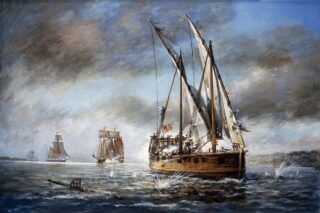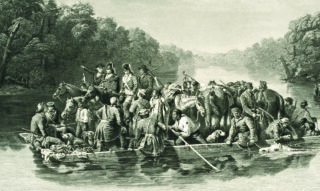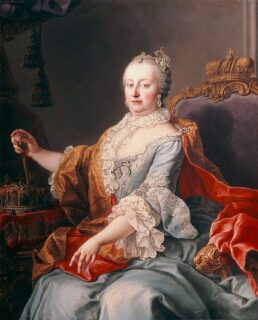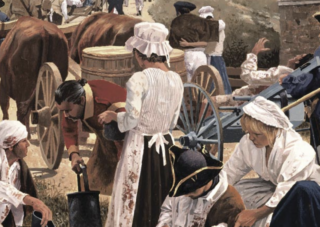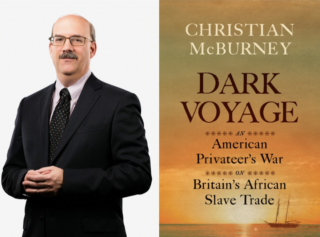Supporting scholarship and promoting popular understanding of the American Revolution is central to the work of the American Revolution Institute. The Institute welcomes distinguished scholars and authors to share their insights and discuss their latest research with the public at Anderson House through lectures, author's talks and panel discussions. The Institute also hosts a variety of other historical programs throughout the year, including our Lunch Bite object talks, battlefield tours, special Anderson House tour programs and other events. Many of the events we offer are free.

July 2022
Lecture – The Artifacts of Arnold’s Bay: Following the Diaspora of Material Culture Over Time
During the last engagement in the 1776 northern campaign season, Gen. Benedict Arnold burned the remaining vessels of his American fleet in Lake Champlain to prevent capture by the British. In 2020, the National Park Service American Battlefield Protection Program funded an archeological survey project of this area, now classified as a Revolutionary War battlefield known as Arnold’s Bay. Historical archaeologists Cherilyn Gilligan and Christopher Sabick of the Lake Champlain Maritime Museum discuss their work on this recent archaeological study…
Find out more »August 2022
Lecture – “A Kind of Partisan War”: An Archaeological Perspective on Francis Marion
When Nathanael Greene was appointed commander of the southern Continental forces in the fall of 1780, he wrote to George Washington that he would be forced to fight “a kind of partisan war,” until he could raise an army large enough to contend with the British. Greene’s strategy was to check the main British army while partisan militia leaders like Thomas Sumter, Francis Marion and Andrew Pickens harassed the British supply lines. Marion was the most famous and successful of…
Find out more »Author’s Talk – The Habsburg Monarchy and the American Revolution
During the Revolutionary War, the Habsburg monarchy, the largest continental European power of the eighteenth century, never formally recognized the United States, but its ruling and mercantile elites saw opportunity, especially for commerce. Bringing together materials from nearly fifty international archives, Jonathan Singerton of the University of Innsbruck reconstructs the full sweep of relations between the nascent United States and one of the oldest European dynasties during and after the American Revolution and offers a reexamination of the Revolution by…
Find out more »Virtual Lecture – “To Have The Bed Made”: Invisible Labor and the Material Culture of Nursing in the Revolutionary War
In this lecture, historian Meg Roberts sheds light on the labor of the Revolutionary War’s caregivers. Alongside the surgeons and physicians, the medical care of the thousands of sick and wounded Continental soldiers relied upon the tireless work of army nurses, camp followers, housewives, cooks, laundresses and local families. In contrast to the voluminous records of soldiers’ and military leaders’ wartime experiences, the contribution of women has often been summarized fleetingly with three verbs: washing, cooking and nursing. The rich…
Find out more »September 2022
Author’s Talk – Dark Voyage: An American Privateer’s War on Britain’s African Slave Trade
Historian Christian McBurney discusses the harrowing voyage of the Marlborough, an American privateer vessel that sailed across the Atlantic to attack British slave trading posts and ships on the coast of West Africa during the Revolutionary War. His new ground-breaking book is the first to explore the efforts of the Marlborough’s officers and crew, along with other American privateers that targeted British slave ships, fostering a better understanding of the Atlantic slave trade during the Revolution and the role American privateers played in diminishing Britain’s slave trading enterprise. The talk will last approximately 45 minutes, followed by a…
Find out more »